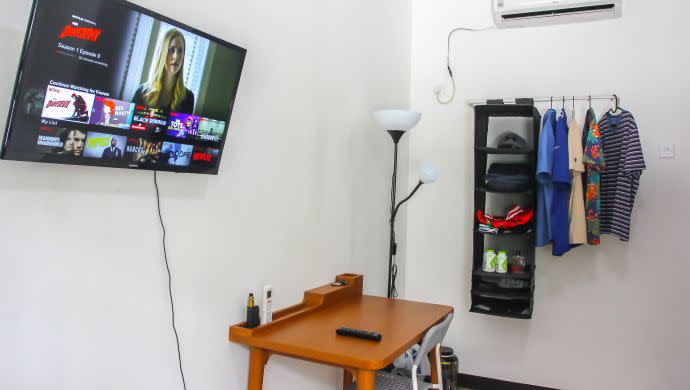Coliving has been known in Indonesia for years. Freeware Spaces aims to modernise it through The Stay
The Stay is the first of three different ranges of coliving spaces that Freeware Spaces is going to launch this year
Entrance to The Stay’s main area
When Kompas published a coverage on coliving trends in Asia, comments made by Indonesian netizens indicated that they were generally not impressed.
“When I saw coliving spaces in the US and other places, it’s very clear to me, this is basically ‘kos-kosan‘,” said Freeware Spaces Group CEO and Founder Aryo P. Ariotedja in an interview with e27, echoing the netizens’ sentiment.
Known as kos-kosan, the concept of coliving has been known in the local market for decades. Owned by individuals, kos-kosan provides space for young professionals or students to live together in. The space is either located at the owner’s own private residence or adjacent to it; they might even invest in building a whole new house specifically for this purpose.
The price range for a typical kos-kosan varied, depending on their location. A mid-range kos-kosan may offer a communal kitchen, bathroom, and a living room, while a more high-end one might even have their own gym and swimming pool.
Starting off from this familiar concept, Freeware Spaces, a coworking space provider in Indonesia, launches its first coliving space The Stay.
Situated in Antasari, South Jakarta, the facility features 16 bedrooms plus a communal kitchen and living room.
It has begun operating this month with eight rooms being offered for rent. At least six of those rooms are already occupied by residents who are either founders or employees of leading Indonesian startups, from Go-Jek, Bukalapak, to Kata.ai.
Residents pay around IDR4 million (US$300) per month; with an extra IDR500,000 (US$37.5), they are able to secure access to Freeware Spaces’ coworking spaces.
“It all begins from our coworking spaces. We have 400 active members and they are always asking if we are ever going to build a coliving space,” Ariotedjo says.
In addition to The Stay, Freeware Spaces is also set to launch The Hood and The Dorm.
Ariotedjo described The Hood as a full-scale co-living with more facilities compared to The Stay; the company is set to open two locations in South Jakarta area.
Meanwhile, The Dorm will have students as their primary target audiences and will be located around universities and schools.
Also Read: Outpost,
Geeks in Cambodia join forces to sponsor local startup
Taking kos-kosan to a whole new level
How does Freeware Spaces aim to modernise a business practice that has been around for decades in the market?
The answer lies in how they integrate the use of tech into the experience.

A bedroom at The Stay
The Stay offers the use of keyless access using thumb print and smart devices on its bedrooms and kitchen (No more gas stove!). It is also set to launch a room management app that allows residents to take care of daily chores such as laundry.
“We are trying to convert a business that is worth a billion dollar but is still fragmented, maybe even lead it to become a unicorn … Like what Go-Jek is doing. They systemised the traditional business model of ojek into something more professionally managed,” Ariotedjo says.
In promoting The Stay and coliving spaces in general, there are several challenges that the company is facing.
Ariotedjo speaks of the time when he had to start promoting Freeware Spaces, in a market where the concept of “coworking space” was basically unheard of. In doing SEO, the company had to settle with promoting their business as “office space rental.”
The same principle goes with promoting The Stay. In its early days, it is easier for the company to market it online by using the keyword “kos-kosan” or “rooms for rent.”
The Stay also relies on word-of-mouth promotions, particularly in the startup communities.
Also Read: Singapore startup Hmlet raises US$1.5M to grow “co-living spaces” in Singapore and Japan
The prospect
Running a coworking space business in Indonesia possesses its own unique challenges.
Competition is very tight with companies raising fundings or merging with each other.
Instead of competing with fellow coworking spaces, coworking spaces in the market has to compete with “ruko” or two-to-three storey office buildings.
“Since the rise of coworking spaces, they have been lowering their price so much that even startups who have not raise any funding are able to afford it,” Ariotedja says.
Unlike in ride-hailing services, it is almost impossible for coworking spaces to be able to market their service using discounts or promotions.
“This is a real business: You subsidise and you die, because you have stuff like utilities to pay,” Ariotedjo says.
Many business owners have to adjust by offering private offices in their facilities as well, following demand from potential users.
Ariotedjo also highlights the difference in what Indonesian customers are expecting from a coworking and coliving space provider.
“We don’t believe in combining coworking and coliving space; people don’t like that … They don’t want to be in a situation where they are resting (because of illness) and their boss is right outside of their door, working,” he explains.
“It makes a lot of sense. Contrary to London, people who live in coliving spaces there are mostly the founders (instead of the employees). I see that our target market here is not digital nomads, but the employees [of the startups],” he closes.
—
Images Credit: The Stay
The post Coliving has been known in Indonesia for years. Freeware Spaces aims to modernise it through The Stay appeared first on e27.


